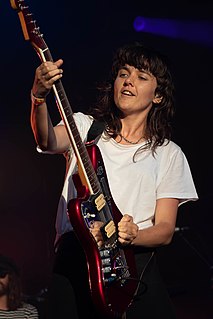A Quote by Sylvia Plath
The thing about writing is not to talk, but to do it; no matter how bad or even mediocre it is, the process and production is the thing, not the sitting and theorizing about how one should write ideally, or how well one could write if one really wanted to or had the time.
Related Quotes
I try to write a lot and my process is kind of back and forth. I procrastinate a lot so when I do sit down to write, I'm pretty lazy at it. And it's such a frustrating thing sometimes - writing - when you don't do it all the time, you get that thing in your head that you have nothing to talk about and you can't write songs.
I think that were I in the middle of an obsession to write about, say, sudden oak death in California or my grandchildren or time and memory and how they look when you get to be in your sixties, and I thought, "Well, yes but people are dying every day in Baghdad," I wouldn't feel guilty about not writing about Baghdad if I didn't have any good ideas about how to write about it.
One thing about having mostly absent parents that I think was perhaps "good" for the development of my intellect/writing is that I was given almost total freedom to read/write/look at whatever I wanted. I wonder a lot about how my past experiences, particularly my negative childhood (home life and being severely bullied/ostracized throughout school) as formed my/my thoughts/my writing, though I should also note those things were far from the only thing that had an impact on me/my writing.
At this rate, I'd be lucky if I wrote a page a day. Then I knew what the problem was. I needed experience. How could I write about life when I'd never had a love affair or a baby or even seen anybody die? A girl I knew had just won a prize for a short story about her adventures among the pygmies in Africa. How could I compete with that sort of thing?
I can't stress enough how important it is to write bad songs. There's a lot of people who don't want to finish songs because they don't think they're any good. Well they're not good enough. Write it! I want you to write me the worst songs you could possible write me because you won't write bad songs. You're thinking they're bad so you don't have to finish it. That's what I really think it is. Well it's all right. Well, how do you know? It's not done!
The wonderful thing about theater is that anything, no matter how tendentious, no matter how stupid it sounds at first glance, can be made to work if it is charged with freshness and originality. You can have an entirely political Shakespeare production and I'll be sitting on the edge of my seat as long as it's surprising, as long as it's not just the standard, "out of the box" pseudo-transgressive production that we just see too much of nowadays.
I don't have an audience in mind when I write. I'm writing mainly for myself. After a long devotion to playwriting I have a good inner ear. I know pretty well how a thing is going to sound on the stage, and how it will play. I write to satisfy this inner ear and its perceptions. That's the audience I write for.
You realize after you travel enough that there's some things that, no matter how good you are at making television, no matter how good your cameras are, how well it's edited, there's no way the lenses could have captured the moment, and there's no way you will ever be able to write about it and do it justice.
Even my colleagues don't read classic criticism. And my feeling is that if you don't do that then you're not really practicing your craft. That's how you learn how to do it. You don't learn how to write about jazz just from listening to jazz. You learn how to write by reading the great writers and how they worked, the great music critics.
I think the first thing - if you want to be a writer - the first thing you need to do is write. Which sounds like an obvious piece of advice. But so many people have this feeling they want to be a writer and they love to read but they don't actually write very much. The main part of being a writer, though, is being profoundly alone for hours on end, uninterrupted by email or friends or children or romantic partners and really sinking into the work and writing. That's how I write. That's how writing gets done.
Writing is a weird thing because we can read, we know how to write a sentence. It's not like a trumpet where you have to get some skill before you can even produce a sound. It's misleading because it's hard to make stories. It seems like it should be easy to do but it's not. The more you write, the better you're going to get. Write and write and write. Try not to be hard on yourself.
I could draw ideas. I remember writing a paper for a seminar class. I remember writing a paper about - and this is going to sound really sort of pretentious, but that's where my mind was at the time - how acting and the performing artist can really be like a Bodhisattva, how they can communicate ultimately an idea in a way that can move and shift things. And that was wonderful. I didn't know many classes where I could try and relate the thing that I really loved and wanted to do into an intellectual idea, and that happened to be one of them.
When I was a film critic, the reason I kind of found it disenchanting was because the things that I wanted to talk about were the ideas in the movie, the theme of it, and contextual elements that weren't necessarily central to the story. But the only thing people really wanted was a plot description and how many stars I'd give it. It didn't matter how much effort you put into writing a piece, they looked at it solely as a consumer's guide toward going or not going to films.






































